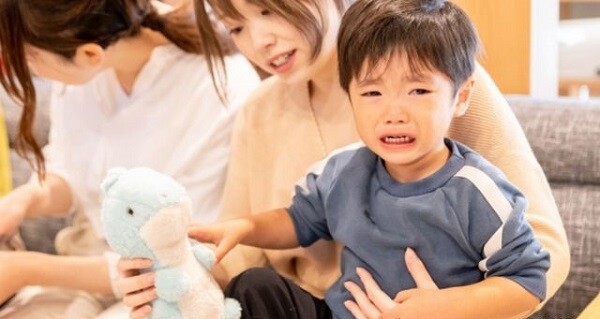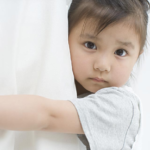It is common for young children to have sensitive temperaments and be easily influenced by their surroundings. As they have not had much exposure to large gatherings, they may feel overwhelmed and anxious when faced with a crowd.
Some children are naturally shyer or more introverted than others, and this can make them feel uncomfortable in crowded situations.

Illustration.
Additionally, if parents or caregivers exhibit anxiety in crowds, children may emulate these feelings and perceive similar situations as unsafe. Crowds can induce a sense of pressure and a loss of control, triggering anxiety in little ones.
Consequently, children may refuse to participate in events, festivals, or outdoor activities, limiting their social interactions and peer connections. Prolonged fear can lead to anxiety, depression, or other mental health issues.
As they grow up, they may struggle to adapt to complex social situations, impacting their academic and professional lives.
To help parents navigate this challenge, child psychologist Nguyen Ngoc Vui offers insightful analysis and practical advice.

Child Psychologist Nguyen Ngoc Vui.
Dear expert, is it normal for toddlers under 3 years old to be afraid of crowds? If they cry or panic, should parents immediately remove them from the situation?
While some toddlers under 3 years old develop language skills well, they may not yet be proficient in their use. As a result, they might struggle to express their feelings or needs clearly to their parents.
So, when they cry or panic, it indicates an unmet need or an internal issue that they cannot articulate verbally. Parents need to be attuned to their child’s cries and understand what these emotions signify to respond appropriately.
Now, is this a typical reaction? It depends on the context and the child’s familiarity with the environment. Are they in a completely strange crowd or a usual setting like daycare or a place of worship? Do they always react this way in crowds, or is it situational?
Parents should assess the circumstances and the meaning behind their child’s cries. For instance, if they are at a family gathering, parents can comfort their child, assuring them that the crowd is safe.

What signs indicate a more serious problem beyond typical fear that parents should be aware of?
There are risks, such as a history of abuse or trauma, that can make a child feel unsafe and fearful, not only in unfamiliar crowds but also in any social interaction. Parents should be vigilant for the following signs:
– The child exhibits extreme fear and deviates from their typical behavior.
– The child becomes uncontrollable, even with parents present.
– The child cannot be calmed or reassured, and their behavior suggests an underlying message that parents cannot decipher.

What should parents do when their child cries or panics in a crowd to help them feel safe and calm down?
Firstly, parents should discern whether the child’s crying is due to their temperament or a sense of danger. Once the root cause is identified, they can respond accordingly.
Next, reassure the child of your presence through words, eye contact, hugs, and soothing touches. Redirect their attention from the crowd to you, their trusted caregiver.
Once you are in a calm environment, initiate a conversation to understand the underlying issue that triggered their fear.

What activities can parents do at home to prepare their children for crowds before attending events?
From my experience, I used to take my children along with me wherever I went before they turned three. As a result, they became accustomed to new environments and crowds, and it became a normal part of their lives.
In contrast, some parents prefer to keep their children at home or limit their exposure to the outside world, unintentionally fostering a fear of unfamiliar places and people.
Therefore, it is beneficial to provide children with opportunities to experience crowds. For example, start by introducing them to peers of a similar age, taking them for strolls in the neighborhood park, and helping them understand that not all crowds are threatening.
Why are children shy and lacking confidence? Technique helps children become confident in life
When parents notice that their child is shy and lacks self-expression, they often compare them to their peers. The intention behind this is to motivate the child to change, but it can actually have the opposite effect. To help your child become more confident, it is important to identify the reasons behind their shyness and lack of confidence, and then find methods to help them build self-assurance in their lives.
Why are children shy and lack confidence? Methods to help children become more confident in life.
When parents see their children being shy and unable to express themselves, they often compare them with their peers. Although this is done with the intention of motivating the child to change, it can actually have a negative effect. Therefore, if you want your child to excel, what you need to do is identify the reasons behind their shyness and lack of confidence, and then find methods to help them become more confident in life.
































